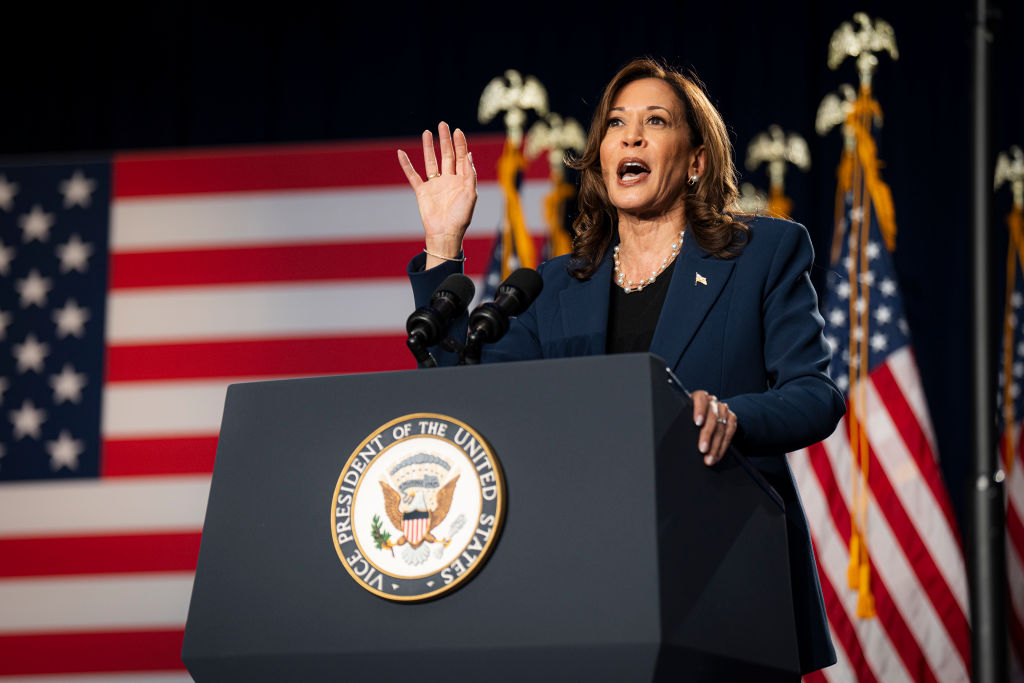Vice President Kamala Harris Holds Slight Lead Over Donald Trump, New National Poll Suggests
Source: MARK FELIX / Getty
Vice President Kamala Harris and Donald Trump are in a tight race as the November presidential election approaches. According to a new poll published by The Guardian on Sept. 4, Harris now holds a slight lead over Trump, sliding past the Republican nominee by two points. But it’s too early to accurately predict who will secure the White House.
The Guardian’s latest polling data found that in comparison with past elections, Harris’s lead is narrower than the leads of previous challengers. For instance, during the 2016 election, Hillary Clinton led Trump by five points, and similarly, Joe Biden had a 6.3-point lead in 2020 against the 78-year-old Republican. While Biden was ultimately victorious, Clinton’s stunning loss to Trump in the 2016 presidential election was shaped by several factors.
Despite winning the popular vote by nearly 2.9 million, Clinton lost the presidency because Trump secured the Electoral College with 304 votes compared to her 227 votes. Along with narrow victories in key swing states like Michigan, Pennsylvania, and Wisconsin, Clinton’s campaign faced criticism for not focusing enough on these crucial states and for its heavy reliance on traditional Democratic strongholds. Economic anxiety among working-class voters, particularly in the Rust Belt, made Trump’s promises to revive jobs appealing. Additionally, the controversy surrounding Clinton’s private email server, the impact of Russian interference, and her public image issues contributed to the election’s outcome. Trump’s unconventional campaign style and media dominance also played a role, helping him resonate with voters dissatisfied with the Democratic political environment at the time.
Michigan voters still gathered after VP Harris and Walz speak Source: Anadolu / Getty
Harris has a slight lead in some swing states, according to The Guardian’s new poll.
Recent data from RealClearPolitics indicates that Harris has made significant gains in swing states like Georgia and Arizona, where she has closed the gap with Trump and even surpassed him in recent polls. The shift is attributed to Harris’s successful consolidation of the Democratic base, including those who had become disillusioned after Biden’s poor debate performance in June.
Out of all voters, Black women have rallied most strongly behind Harris–and ensured commitments from other demographics. If elected, Harris, who is Black and South Asian, will be the first woman to ever the post. A recent report highlighted a significant surge in voter registration among Black women in 13 key states, with rates rising over 175% compared to the same period in 2020, according to data from Target Smart. This represents nearly a threefold increase from four years ago. The overall voter registration rate for Black women has soared by more than 98%, while registration among all Black voters has increased by over 85% following Harris’s bid for president.
National polling, though significant, doesn’t tell the whole story.
The U.S. presidential election is ultimately decided by outcomes in individual states, which allocate electoral college votes. Key swing states like Pennsylvania, Arizona, and Georgia are crucial to winning the presidency. Although Harris holds a narrow national lead, it is not enough to guarantee victory in the critical swing states where the election will be decided. Furthermore, in seven key swing states, Trump and Harris are separated by just two points, which falls well within the margin of error for polls, The Guardian noted.
Still, Harris remains determined to win the presidential race, and won’t back down without a fight. On Sept. 2, the 59-year-old Democrat traveled to Michigan, Wisconsin and Pennsylvania where she held several Labor Day events and vowed to keep going despite opposition from the Republican party and the latest poll results.
Source: SAUL LOEB / Getty
Union Support May Make The Difference In November.
According to CNN polling data–even as it favored her–was not the Vice President’s focus. Rather, Harris said “I’m telling you we know how they play, we know what they do, so let’s not pay too much attention to the polls. Let’s know, like labor always does, we are out here running like we are the underdog in this race because we know what we are fighting for.”
Chicago teachers on strike in 2019 during Trump Administration Source: Scott Olson / Getty
Harris’ remarks in Pennsylvania closely echoed her earlier speech in Detroit, where she emphasized the value of “the dignity of work” and committed to bolstering protections for collective bargaining. Addressing a crowd of union members and leaders, she drew a stark contrast between her policies and those of her opponent, Donald Trump. As the election cycle was revving up last year, the AFL-CIO called Trump’s labor policies devastating and catastrophic.
The Vice President, on the other hand, reaffirmed her commitment to the PRO Act, which aims to safeguard workers’ rights to unionize and negotiate collectively for workplace improvements. She also vowed to eliminate union busting, a practice from the Trump era aimed at undermining worker protections through executive order. His measures instructed agencies to quickly renegotiate collective bargaining agreements, imposed arbitrary deadlines for these negotiations, and, if deadlines were missed, allowed agencies to unilaterally enforce their own terms.
SEE MORE:
Underscoring The Key Role Labor Unions Are Playing In The 2024 Election
The post Vice President Kamala Harris Holds Slight Lead Over Donald Trump, New National Poll Suggests appeared first on NewsOne.

